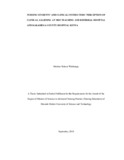Please use this identifier to cite or link to this item:
http://ir-library.mmust.ac.ke:8080/xmlui/handle/123456789/1284Full metadata record
| DC Field | Value | Language |
|---|---|---|
| dc.contributor.author | Wakhungu, Metrine | - |
| dc.date.accessioned | 2019-09-24T07:50:51Z | - |
| dc.date.available | 2019-09-24T07:50:51Z | - |
| dc.date.issued | 2019-09 | - |
| dc.identifier.uri | http://r-library.mmust.ac.ke/123456789/1284 | - |
| dc.description | MASTERS THESIS | en_US |
| dc.description.abstract | One of the criteria for effective learning in nursing education is clinical learning experience by students. Clinical competence is the ability to effectively integrate cognitive, affective and psychomotor skills when delivering nursing care. The aim of this study was to investigate the determinants of clinical learning among Bachelor of Science in nursing students. The study objectives were; to analyse the influence of clinical leaning environment on clinical learning, to determine the contribution of clinical instruction on clinical learning and to examine the influence student factors on clinical learning. The study employed cross sectional research design. Study targeted 200 participants (165 student nurses, 20 ward managers and 15 clinical instructors) sampled through purposive sampling. Data was recorded in SPSS version 21.0 and analysed using t-test for means. A non-para-metric test (Mann-Whitney U-test) was used to determine differences between students and clinical instructors’/ward managers. Statistical significance was determined at p=0.01 as the study focused on perception of the participants. The data was presented in form of tables. Three factors were found to be the predictors of clinical learning. These were; clinical placement (p=0.015), practice on patients (p=0.0004) and length of clinical attachment (p=0.04). Therefore, the study recommends that there is need for hospitals and teaching facilities to establish appropriate planned schedule with adequate time for clinical learning. The clinical nurses should be well prepared to assist student and be an example to the students when they come to the clinical area. Finally, intervention studies involving larger sample size with wider scope may be needed to establish competency in clinical learning. The findings will be useful to the higher education institutions and teaching hospitals in planning and implementation clinical learning of nursing students for clinical learning improvement through providing an enabling clinical learning environment, ensuring appropriate clinical instruction and encouraging student factors that promote clinical | en_US |
| dc.description.sponsorship | SCHOOL OF NURSING | en_US |
| dc.publisher | MMUST | en_US |
| dc.subject | clinical learning | en_US |
| dc.title | NURSING STUDENTS’ AND CLINICAL INSTRUCTORS’ PERCEPTION OF CLINICAL LEARNING AT MOI TEACHING AND REFERRAL HOSPITAL AND KAKAMEGA COUNTY HOSPITAL KENYA | en_US |
| dc.type | Thesis | en_US |
| Appears in Collections: | School of Nursing, Midwifery and Paramedical Sciences | |
Files in This Item:
| File | Description | Size | Format | |
|---|---|---|---|---|
| Metrine Nekesa Wakhungu.pdf | 2.47 MB | Adobe PDF |  View/Open |
Items in DSpace are protected by copyright, with all rights reserved, unless otherwise indicated.
